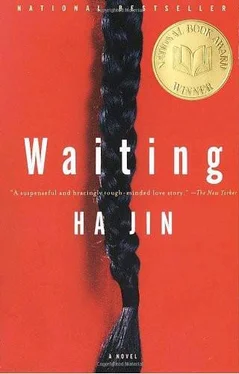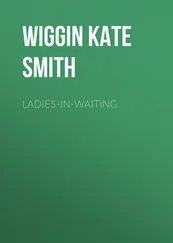In the meantime, the boys were growing rapidly, each having gained two inches and six pounds in two months. River was now slightly bigger than his younger brother Lake.
One morning Juli pushed the baby carriage out of the hospital to watch a column of police trucks parading criminals through the streets. Two drug dealers had been sentenced to death and a rapist to life. Each of the criminals carried above his head a wooden placard whose base was tied to his back. A young woman was also among them; she, who had once been a teacher in a kindergarten, had locked a naughty boy in a basement to teach him a lesson, but she had forgotten to release him. The child had starved to death, and she was going to serve fourteen years in prison.
When the twins returned home, their faces became bluish. Manna was unhappy and told Juli never to take them out in the freezing weather again. That afternoon the babies began to have loose bowels.
Their father took them to Doctor Min, a young pediatrician who had just graduated from the Second Military Medical University. The diagnosis was dysentery. Like deflated balloons, the twins seemed to have withered all of a sudden, their heads drooping and their eyes lusterless, both whimpering a little and breathing heavily. Juli was scared, declaring tearfully that she hadn't fed them anything unclean. Neither Manna nor Lin blamed her more, though they were baffled by the cause of the disease. Probably the babies' drinking water hadn't been boiled long enough to kill all the bacteria.
To prevent dehydration, the twins had to be given an intravenous drip of glucose and salt water without delay. The nurses went about working on Lake and River at the same time, but the babies' blood vessels were hardly visible and were so thin that the nurses tried several times unsuccessfully to lodge a needle into them. The twins were screaming hoarsely. To Lin, his sons' arms looked almost transparent, so he was impatient with the nurses who couldn't find their blood vessels. Yet he dared not try to do it himself; neither could he watch for long the needles probing beneath his sons' tender skin. They made his heart twinge and his chest contract. For the first time in his life he was experiencing this kind of paternal suffering, which caused him to tremble a little. He realized that he did love the babies, his nose twitching and tears welling up in his eyes. If only he could substitute for them!
Doctor Min prescribed coptis powder, which is said to be the bitterest thing on earth and which the babies had to take three times a day. No matter how much sugar the parents mixed with the yellow powder, the twins would cry hard when forced to swallow the medicine. The parents and the maid worked as a team, one holding River, another pinching his nose shut and prying open his mouth with a spoon, and the third thrusting the spoonful of coptis powder mixed with sugar into his mouth, then washing it down with warm water. Done with River, they went on to Lake, who had been bawling furiously.
A week later the dysentery still persisted; every day each of the babies would relieve his bowels six or seven times. Juli had to take them to the medical building for the drips every afternoon. Their parents were desperate.
Hua came on Sunday morning. At the sight of her stricken half brothers she couldn't stop her tears. She reminded her father that purslane might help, since in their home village people always used this herb to treat loose bowels. Lin remembered that several years ago when he visited a clinic in the countryside, he had seen barefoot doctors cook purslane stew in a cauldron. The villagers who suffered from diarrhea or dysentery would go to the front yard of the clinic and eat a bowl of the stew. At most it took three bowls to cure the illness. But now it was wintertime; where on earth could he find purslane?
Nevertheless, he bicycled downtown right away, believing some medicinal herb stores might have dried purslane. He went to every one of them in Muji, but was told that this was an item that no herb store would carry.
"Why not?" he asked.
"It's a tradition, I don't know why not. Perhaps because it's just a vegetable," a beardless old clerk told him.
The babies were getting weaker and weaker. Apparently the cop-tis powder didn't work. As a last resort, Doctor Min decided to give them enemas, to wash their bowels with coptis solution directly. This treatment turned out to be very effective. Within three days, new tests showed that the bacteria had disappeared from the babies' intestines. Yet the symptom did not diminish; the twins continued to have loose bowels. In addition, they wouldn't pass water: their urine was excreted through their anuses.
Doctor Min was totally bewildered by this case. After two days' thinking she decided that though the dysentery had been cured, the twins still suffered from a nervous disorder that was impossible for her to treat. She said to the nurses, "I'm afraid we have to let nature take its own course."
Lin and Manna were at their wits' end, since nobody knew what to do about the babies' nervous disorder. A cook suggested they give the twins some mashed garlic. They told him that the babies were too young for that. Besides, garlic mainly works as an antibiotic, and the bacteria in the babies' intestines had been eliminated.
Then Hua came one evening and told her father, "Mother said you should feed them some mashed taro mixed with white sugar and egg yolk."
"How come she's so sure it will work?" Lin asked. Manna moved closer, listening intently.
"Mother said it helped me once," Hua answered. " When I was five and had dysentery, Mother made me drink a lot of herb decoction, but it didn't cure the disease. Our neighbors thought I was dying and couldn't be saved. Uncle Bensheng ran to Wujia Town and got the recipe from an old doctor."
"How do you cook the egg yolk?" Manna broke in.
"Just hard-boil the eggs."
Though still doubtful, without delay Lin bought five pounds of taros from a vegetable shop and prepared the folk remedy. The twins enjoyed eating the mashed taro, opening their mouths like baby swallows receiving food from the mother bird. To everyone's amazement, that very night the babies stopped defecating. Within two days they began to urinate normally. Many doctors and nurses harbored misgivings about folk remedies, but this time everybody was impressed.
At long last the twins were cured, and Lin was possessed by a new, mysterious emotion, which occasionally brought tears to his eyes. He felt the babies had almost become a part of himself. The week before, he had read in Heilongjiang Daily that a retired clerk had donated a kidney to his son. These days Lin kept asking himself whether he could do the same for his children.
Along with their dysentery, the babies' nightly wakefulness was also cured. Now they would go to sleep early in the evening and remain peaceful until daybreak. Even when they were given the bottle at midnight and when their father changed their diapers, they would make no noise. Their normal sleep made it possible for their parents to spend some time together in the evening. After the babies fell asleep, Lin and Manna often lounged on the sofa, chatting or watching news or a movie on TV. At last they could enjoy a little peace.
One evening in late November there was a featured report on TV entitled "To Get Rich Is Glorious," which showed how some people in the South had responded to the Party's call and grown affluent. A young man had bought dried mushrooms and ginseng roots from Manchuria and sold them in Fujian Province at higher prices, and within five years he owned seven stores in different cities. An engineer had quit his regular job and made a fortune by running two chicken farms, which employed 130 hands. A middle-aged woman had opened a clothing shop just three years ago, but now she had become a local magnate and had hired sixty workers to make fashionable garments in her shop. At the last Spring Festival she donated ten thousand yuan to an elementary school, so she was admitted into the Communist Party and elected a model citizen. Every one of these entrepreneurs became a legendary figure. A few years ago their ways of making money had been illegal, but now the nouveaux riches were held up as examples for the masses to follow.
Читать дальше











